Liberal Future: English Youth Say … WE WANT WORK!
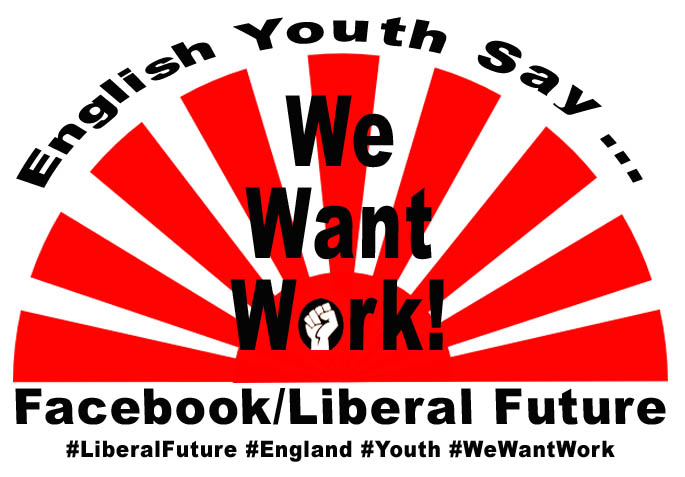
Date: January 23, 2021
Categories: Liberty Wall
Wednesday, 15 January 2025
 LIBERAL FUTURE – LF – has always opposed the European Union. We believe that its end goal is the formation of a United States of Europe. We’ve no interest in Empires or Superstates as they tend to be highly centralised political and economic systems. We favour smaller, ‘rooted’, nations – all based on a human scale – which are freely allowed to express their traditions, language and identity without any outside interference.
LIBERAL FUTURE – LF – has always opposed the European Union. We believe that its end goal is the formation of a United States of Europe. We’ve no interest in Empires or Superstates as they tend to be highly centralised political and economic systems. We favour smaller, ‘rooted’, nations – all based on a human scale – which are freely allowed to express their traditions, language and identity without any outside interference.
However, whilst LF is opposed to the EU we’re not anti-European. Indeed, how could we be anti-European when the UK (indeed, the whole of the British Isles) constitutes part of Europe? We’re proud to be both Britons & Europeans.
It is important to distinguish between the European Union (EU) and Europe itself. We feel that the EU is a rich man’s club for powerful corporate big business and banking elites. Here, their underlings – also known as politicians – are happy enough with the trappings of power.
For us Europe isn’t about money, Gross Domestic Product (GDP) or profit margins. Europe – from the Atlantic in the West to the Urals in the East & the Arctic Ocean in the North to the Mediterranean Sea in the South – represents a shared culture, history & heritage. In short, for us Europe is about people.
This new LF series – Days In Europa – will develop our ideas about European solidarity and co-operation. We’re not petty nationalists so we want to see a Europe of free peoples and nations based on the twin ideas of National Freedom & Social Justice. If we were to sum up our ideal vision in a simple slogan it would be: Love Europe – Hate The EU.
With all of this in mind, we’d also like to use this opportunity to explore the beauty of Europe. And we kick off with a look at the Cathedral of Vasily (Basil) the Blessed, more commonly known as St. Basil’s Cathedral, in Moscow, Russia.
Situated like an island at the southern end of Red Square it was built between 1555 – 1561. The Orthodox Christian Cathedral was built on the orders of the first Tsar of Russia, Ivan IV Vasilyevich (better known as Ivan the Terrible) to commemorate his victory in the Russo-Kazan Wars, which included the capture of Kazan and Astrakhan.
St. Basil’s is a striking & iconic building. Built from ornate red brick it features ten chapels and ten vividly coloured onion-shaped domes. These are said to represent the flames of a bonfire. It must be one of the most beautiful – and photogenic – buildings in Rusia, if not Europe itself. Inside the Cathedral (on the first floor) is the last resting place of St. Basil, whilst outside is a platform from which the Tsar would announce executions and general orders.
During the (state atheist) era of the Soviet Union the Cathedral was used as a State Historical Museum. However, since 1997 it has been open for weekly services & prayers.
• FOR MORE information about Liberal Future – the youth wing of the National Liberal Party – check out: https://nationalliberal.org/liberty-wall-3/liberal-future
• LIBERAL FUTURE would like your views on both this article & our ideas for a future Europe. Simply post your comments when you see this article posted on our Facebook page https://www.facebook.com/ groups/706779429376233 and/or the National Liberals Facebook page https://www.facebook.com/ groups/52739504313
• READERS MAY be interested in the logos which feature at the bottom of the first Days In Europa poster produced by Liberal Future – the youth wing of the National Liberal Party.
The circular black & orange logo (on the left) symbolises the fusion of progressive nationalism and liberalism. Here we give equal weight to ‘national questions’ (concerning all of the nations & peoples of the British Isles and in principle, beyond) as we do to ‘liberal’ questions (concerning the individual and freedom).
The square orange logo (centre) is the official symbol of Liberal Future. We’ve used it since 2014 when the idea of creating a youth movement for the National Liberal Party was first mooted: https://nationalliberal.org/liberalfuture-–-a-manifesto-for-our-youth
Finally, the white, blue & red logo is the official flag of the Russian Federation. The history of the flag is interesting as it’s based on the Dutch tricolour. During the Soviet era it was replaced by the hammer & sickle flag but was reintroduced in 1991.
Date: January 8, 2021
Categories: Liberty Wall, Party News
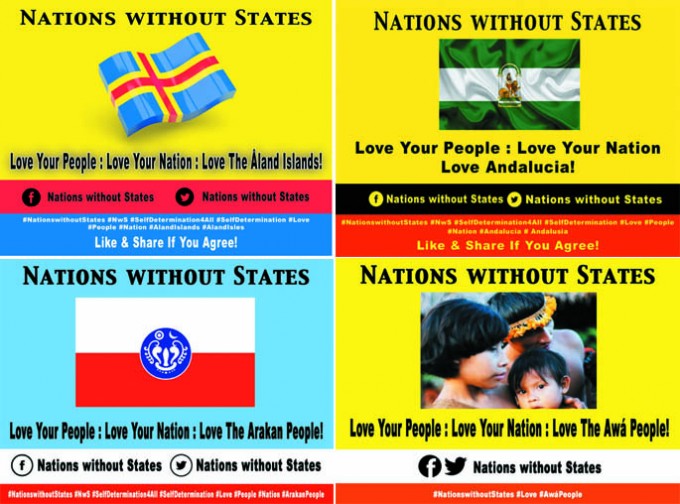 .
.
• CHECK OUT the original full size Love Your People: Love Your Nation e-posters. Don’t forget to viral them outvia social media and also Like and Share them on Facebook:
Love Your People: Love Your Nation : Love The Åland Islands! http://nationalliberal.org/from-the-liberty-wall-–-nations-without-states-love-your-people-love-your-nation-love-the-aland-islands
Love Your People: Love Your Nation : Love Andalusia! http://nationalliberal.org/from-the-liberty-wall-nations-without-states-love-your-people-love-your-nation-love-andalucia
Love Your People : Love Your Nation : Love The Arakan People! http://nationalliberal.org/from-the-liberty-wall-–-nations-without-states-–-love-your-people-love-your-nation-love-the-arakan-people
Love Your People : Love Your Nation : Love The Awá People! http://nationalliberal.org/from-the-liberty-wall-–-nations-without-states-–-love-your-people-love-your-nation-love-the-awa-people
• ALSO CHECK OUT: From The Liberty Wall – Nations without States – From The Aborigines to The ÅlandIslands Via The Aché People & Alahwaz – Love Your People: Love Your Nation! http://nationalliberal.org/from-the-liberty-wall-–-nations-without-states-–-from-the-aborigines-to-the-aland-islands-via-the-ache-people-alahwaz-love-your-people-love-your-nation
Date: December 18, 2020
Categories: Liberty Wall
WE NATIONAL LIBERAL TRADE UNIONISTS – NLTU – are neither Capitalists nor Socialists. We feel that both systems are built on exploitation as they ultimately turn workers into mere wage slaves. We also believe that both systems tend to concentrate power & wealth in the hands of the elites. In the case of Capitalism, it’s the corporate bosses – whereas under Socialism, it’s the party bosses. Furthermore, we feel that Capitalism encourages egotism & a disdain for ordinary working folks. Socialism, on the other hand, can lead to an unhealthy social levelling & the stifling of individual natural drive and ambition. Thus, to paraphrase George Galloway, we regard Capitalism & Socialism ‘as different cheeks of the same arse.’
The NLTU favours economic systems which give workers the opportunity to advance & better themselves – without becoming a wage slave. We also prefer self-sufficiency (over imports) and thus support both national & social liberation.
With the above in mind, we feel that trade unionists would find food for thought in this article Restore The Guilds. It was written by Gary Dorrien & was published in the Plough Quarterly – https://www.plough.com/en/topics/justice/social-justice/economic-justice/restore-the-guilds – a US-based ‘magazine of stories, ideas, and culture to inspire faith and action’. This is the third in the series and should be read directly on from part 1 & part 2 – see links below.
As always, we invite our readers to share their thoughts when this article is reproduced on the NLTU Facebook site – https://www.facebook.com/groups/277840098977231/ – or the National Liberals Facebook site – https://www.facebook.com/groups/52739504313/ It goes without saying that there are no links between Gary Dorrien, Plough Quarterly, the NLTU and the National Liberal Party. We’d also like to point out that whilst the article is written from a Christian perspective, the NLTU and NLP welcome members & supporters from all religions and none. Please note that the NLTU has kept the original US spellings and phrases as they are.
.
Restore The Guilds – What today’s labor unions, democratic socialists, and mutual aid societies might learn from the colorful history of Christian socialism in Britain.
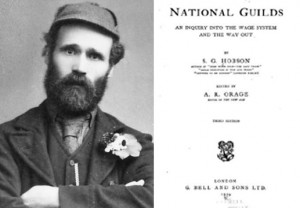
(Left) James Keir Hardie (1856-1915) started his working life aged eight as a baker's delivery boy. By age 11 he was a coal miner, working between 12-14 hours a day. He became involved with the Ayrshire Miners' Union & then the Scottish Miners' Federation. In 1887 he published The Miner, a monthly newspaper. Hardie resigned from the Liberal Party in 1888 & helped organise the Scottish Labour Party, as he believed that the working-class needed its own political party. In 1893 he helped establish the Independent Labour Party - ILP. One of those who helped him establish the ILP was Ulster-born Samuel George Hobson (18701940). Hobson later developed his theory of guild socialism & in 1914 published National Guilds: An Inquiry into the Wage System and the Way Out (Right). This consisted of many articles he’d previously written for the New Age, the influential weekly magazine edited by A R Orage. Hobson advocated that the Guilds should serve as the organs through which industry would be organised in a future socialist society – in a similar way to Syndicalism or Corporatism.
In 1893 a Christian socialist labor leader, Keir Hardie, founded the Independent Labour Party (ILP), which compelled many socialists to make an excruciating choice: Should they stay in the radical wing of the Liberal Party or join the party of actual workers? A worker’s party might be a disaster for anti-imperialism and anti-racism. Joining the ILP might destroy the anti-imperialist wing of the Liberal Party, and it might hand the government to the Tories, which, in fact, it did. Christian socialists Stewart Headlam and Scott Holland stuck with the left wing of the Liberal Party for these reasons. Christian socialists S. G. Hobson (who would coin the term “guild socialism”), Charles Marson, and Conrad Noel countered that socialists had to be with the workers and convert them to antiimperialism, anti-racism, and anti-militarism.
Both of these groups had contentious relationships with the mainstream of the Fabian Society, an activist powerhouse led by sociologist Sidney Webb, his wife Beatrice Webb, and literary star George Bernard Shaw. The Fabians contended that British socialism did not need Marx’s glorification of revolutionary violence or his exotic doctrines; all it needed was to proceed on its present course. The reach of government grew every year. This process was relentless, beneficial, and civilizing. It tamed the predatory impulses of capitalism, making society rational. Soon the flow of progress would civilize England and the entire world. All manner of late Victorians believed the world was progressing toward higher forms of civilization and democracy. Even Marxists held a version of the belief in progress. The Fabians turned this belief into an argument for bureaucratic state collectivism. Socialism was government ownership directed by elite managers, that is, Fabians(1).
But Christian socialists fit their ideology to their ethical convictions, not the other way around. Even those who joined the Fabian Society fought for the ethical difference when it arose. It arose repeatedly over imperialism and racism. Britons were schooled in the lore of the British Empire, a tale of mercantile colonization under the Stuarts and Cromwell; war victories against the Dutch, French, and Spanish in the seventeenth century; the acquisition of eastern North America; slave-trading outposts in Africa; commercial interests in India; and Disraeli’s incursions into Egypt, India, Afghanistan, and South Africa during the 1870s. In the 1880s a new kind of imperialism emerged, one that had to be opposed differently than the old kind. Old-style anti-imperialists conceived of empire as a problem of power lust and military overreach cured by left-liberal politics. The new imperialism was driven by fierce economic competition for new markets, and it grew no matter which party won office. John Hobson wrote about this historical turn as it happened, publishing ten books before he wrote his famous book Imperialism in 1902, contending that modern capitalism was unsustainable without exploiting colonized markets. Hobson did not say that economics explains everything. He made moral and political arguments, providing sermon material for Christian socialists. Noel, Marson, Holland, and Charles Gore blasted the Boer War and the plunder of Africa. They fought against Shaw and the Webbs for touting their patriotism with racist arguments. British Christian socialists were vocal anti-imperialists right in the belly of the beast. Some made bishop anyway, notably Gore and William Temple, because that was England too (2)
(1) Sidney Webb, Socialism: True and False (London: The Fabian Society, Fabian Tract No. 51, 1894); Webb, Twentieth Century Politics: A Policy of National Efficiency (London: The Fabian Society, Fabian Tract No. 108, 1901).
(2) John A. Hobson, Imperialism (1902; reprint, London: Allen and Unwin, 1948).
• THIS ARTICLE should be read in conjunction with the following:
From The Liberty Wall – National Liberal Trade Unionists – Restore The Guilds (Part 1) http://nationalliberal.org/ from-the-liberty-wall-–-national-liberal-trade-unionists-–-restore-the-guilds-part-1
From The Liberty Wall – National Liberal Trade Unionists – Restore The Guilds (Part 2) http://nationalliberal.org/ from-the-liberty-wall-–-national-liberal-trade-unionists-–-restore-the-guilds-part-2
• READ issue 1 of Liberal Worker – The Voice Of The National iberal Trade Unionists (NLTU). To get your FREE pdf copy, simply e-mail natliberal@aol.com
Date: December 5, 2020
Categories: Liberty Wall
WELCOME TO part 2 of Restore The Guilds. Written by Gary Dorrien for the Plough Quarterly,a US-based ‘magazine of stories, ideas, and culture to inspire faith and action’, the article – https://www.plough.com/en/ topics/justice/social-justice/economic-justice/restore-the-guilds – provides an excellent history of Guild Socialism (referred to as ‘Christian socialism’ in the article). This article should be read directly on from part 1: http://nationalliberal.org/from-the-liberty-wall-%e2%80%93-national-liberal-trade-unionists-%e2%80%93restore-the-guilds-part-1
As we’ve previously noted, we National Liberal Trade Unionists – NLTU – are neither of the ‘left’ nor the ‘right’. In fact, we feel that these terms are somewhat redundant as there’s barely a fag paper between the Tory ‘left’ & the Blairite/Social Democratic ‘right’ of the Labour Party. Indeed, who would’ve ever thought that any Tory Chancellor of the Exchequer – currently Rishi Sunak (1) – would be spending money like it was going out of fashion? (It’s just a shame that it’s taken Covid-19 to loosen the purse strings.)
We also view ourselves as ‘beyond class’ as we feel that to describe people solely by class is very restrictive. In fact, why should we effectively be forced to label ourselves according to the dictats of capitalism?
All of the above should make it very clear that the NLTU is interested in ‘alternative’ – and especially co-operative – economic systems. This is especially so when it can transcend the two traditional ‘sides’ of the economic equation – employers & employees. We feel that one way of doing this could be the introduction of a modern Guild system – Guilds, as described by the Encyclopaedia Britannica, being ‘an association of craftsmen or merchants formed for mutual aid and protection and for the furtherance of their professional interests’ (2).
As always, we invite our readers to share their thoughts when this article is reproduced on the NLTU Facebook site – https://www.facebook.com/groups/277840098977231/ – or the National Liberals Facebook site https://www.facebook.com/groups/52739504313/ It goes without saying that there are no links between Gary Dorrien, Plough Quarterly, the NLTU and the National Liberal Party. We’d also like to point out that whilst the article is written from a Christian perspective, the NLTU and NLP welcome members & supporters from all religions and none. Please note that the NLTU has kept the original US spellings and phrases as they are.
.
Restore The Guilds – What today’s labor unions, democratic socialists, and mutual aid societies might learn from the colorful history of Christian socialism in Britain
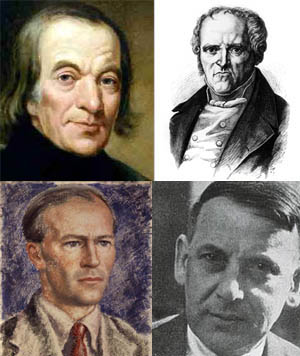
(Top left) Robert Owen (1771–1858) was a Welsh manufacturer turned social reformer. An early advocate of utopian socialism, he put his ideas into practice with the establishment of his New Lanark mills in Lanark, Scotland. A visionary, he instituted social & industrial welfare reforms including the opening of Britain’s first infant school. (Top right) Charles Fourier (1772–1837) was a French utopian socialist who believed in a cooperative form of society where workers would live in communities he called “phalanxes.” He was also an early supporter of women’s rights. (Bottom left) George Douglas Howard Cole (1889-1959) was a noted anti-fascist libertarian socialist who developed & popularised the theory of guild socialism. He formed the National Guilds League in 1915 and published several books on guild socialism as well as books about Robert Owen & William Morris. (Bottom right) Arthur Penty (1875–1937) was influenced by William Morris & John Ruskin and is credited with formulating Christian socialism based on the Guilds. A distributist, Penty also published Restoration of the Guild System in 1906.
SOCIALISM WAS ORIGINALLY A VISION that society could be organized as a cooperative community. In the 1820s, Charles Fourier in France and Robert Owen in England championed the idea of an economy based on cooperation and community. Instead of pitting workers against each other, a cooperative mode of production and exchange would allow them to work for each other. Fourier and Owen founded socialist movements that dreamed of replacing the state, or restricting it, or enlisting it to support producer cooperatives. Debates over these issues roiled the socialist movement from the beginning and sundered the first movement for Christian socialism.
Christian socialism began in the 1840s with the Anglican trio of Frederick Denison Maurice, John Ludlow, and Charles Kingsley. Maurice, a theologian and cleric, argued that cooperation is the moral law of the divine moral order. Socialism reflects the divine order by creating a cooperative society. Fatefully, the first Christian socialists clashed over consumer cooperatives, the state, and cooperative syndicates. Why should producer cooperatives be favored over consumer cooperatives? Should the state finance producer cooperatives? Are labor syndicates inevitably divisive and radical? Debates over these issues thwarted the first wave of Christian socialism.
The mighty second wave in Britain, beginning in the 1880s, was mostly Anglo-Catholic. Many Anglican socialists were stubbornly cooperative in the Owen and Maurice mode, some joined the Fabian movement after it arose in 1884, some joined the Christian Social Union reformers who came out of Oxford, some gave highest priority to socializing land, and many joined the workers party movement after it arose in 1893. But Christian socialism had an ethical wellspring that qualified its commitment to these ideologies. Christian socialists were committed to an ethic of equality, freedom, cooperative community, and divine love. No ideology, whether Fabian or Syndical or Social Unionist or Marxist, was more binding than these religious and ethical convictions.
(1) Britain’s Reactionary Racists React! http://nationalliberal.org/britain%e2%80%99s-reactionary-racists-react
(2) Encyclopaedia Britannica https://www.britannica.com/topic/guild-trade-association
• IF YOU want to help the National Liberal Trade Unionists promote a sensible non-socialist (but still anti-capitalist) form of trade unionism please contact us via natliberal@aol.com and/or visit our Facebook site https://www.facebook.com/groups/277840098977231/
• ALSO Check out: Twitter @National Liberal
Date: November 6, 2020
Categories: Articles, Liberty Wall
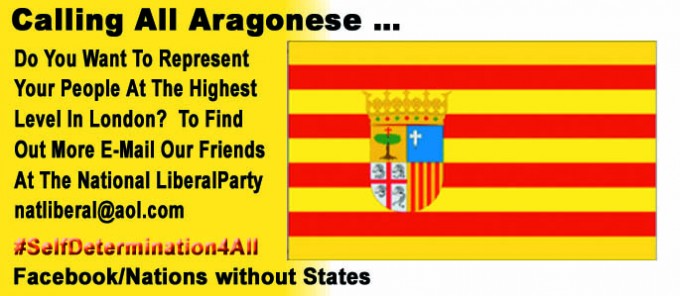
FIVE MONTHS AGO – on 7th May – our friends and comrades of the National Liberal Party (NLP) should have been fighting the Greater London Authority elections. The plan was to stand up to 25 candidates who would be campaigning to raise awareness of the vital issue of Self-Determination.
Regular readers will be aware that, due to Covid-19, the GLA elections had to be scrapped. They’re now been rescheduled to take place in May of next year. To some extent this has worked out in our favour as it gives Self-Determinists another seven months to organise.
With the above in mind, Nations without States would like to appeal to all of those who support our ideal of Self-Determination For All to financially support the NLPs GLA election campaign.
As we all know, democracy doesn’t come cheap – especially in London! A quick look at the official London Elects web-site – https://www.londonelects.org.uk/im-candidate/nominations will confirm this.
Talking about Self-Determination is one thing, but doing something positive & practical is another. So, will you put your money where your mouth is by donating to the election campaign? Your donation doesn’t need to be much – in fact, all donations small (or large) are very much welcome.
Even if you can only afford to send £1 a month, it all adds up. For instance, if 1,000 Self-Determinists sent in £1 a month, that’ll bring in a total of £1,000. If these small donations are repeated on a monthly basis from (and including) today until to election day – on Thursday 6th May 2021 – we’ll be looking at a total of £8,000.
Now that’ll be small change compared to what the Establishment parties can raise. But it’ll go a some way to promoting Self-Determination to London’s electorate. The NLP are used to making a little go a long way, so something like £8,000 will give the enemies of Self-Determination something to think about!
Will you support those brave candidates who’re representing your nation & people? Will you support the activists who’ll be out leafleting and canvassing in different areas of London? Indeed. will you support the efforts of the NLP to promote Self-Determination? Let’s put the noses of our oppressors out of joint & send shockwaves through the system – donate today!
This can be done via http://nationalliberal.org/the-party-organisation/donate or by transfer to the Bank of Scotland, NLP (ac)12-11-03, (s/c) 06186181
One group who may benefit from having their cause brought to the attention of London’s population of nearly nine million are the Aragonese.
The Arangonese, like the Andalucians who we featured last month (see here: https://nationalliberal.org/from-the-liberty-wall-–-nations-without-states-–-calling-allandalusians-living-in-london) hail from Spain. However, whilst Andalucia is the southernmost of Spain’s 17 autonomous communities (Spain is a decentralised unitary state which has devolved some powers to these communities) Aragon is in the North East.
Aragon broadly consists of the land that was formally known as the independent Kingdom of Aragon, which existed from 1035 – 1707. Landlocked, it shares its Northern border with France, Castilla-La Mancha in the South West, Castile-León, La Rioja & Navarre (all in the West), Catalonia in the East & the Valencian Community to the South East.
With an area of 18,420 square miles around half of the total population (1,308,563 as at January 2016) lives in the capital of Zaragoza. The idea of some greater form of Self-Determination appears to run high in Aragon. In a 2011 survey, nearly 48% of the population wanted greater autonomy whilst just over 3% favoured full independence.
This may be linked to a popular revival of the Aragonese language – as of 2011 Aragonese was spoken – in several dialects – by around 12,000 people. Aragonese speakers are largely concentrated in the mountainous northern counties of the Pyrenees. (Aragon consists of three provinces, Huesca, Zaragoza and Teruel. These are, in turn, sub-divided into 33 counties.)
There are several parties which advocate different forms of Self-Determination. However, at root, they base their claims on the idea that Aragon is a historical nationality with its own history, language, laws & culture.
As with the Andalucians there’s no way of knowing how many Spanish living in London would define themselves as Aragonese & what form of Self-Determination they desire. We know that Kensington, Regents Park & Chelsea (in West London) are the areas which have the highest number of Spanish-born residents. We also know that Southwark (in South London) is the borough where Spanish is the second most commonly spoken language.
Therefore, if there are any readers who live and/or work in these areas of London who know anyone who is of Aragonese background, please ask them to get in touch with the National Liberal Party as soon as possible – e-mail: natliberal@aol.com The message from Nations without States is clear: For the sake of Aragon don’t delay – take action today!
• ALSO Check out:
From The Liberty Wall – Nations without States – Calling All Aborigines, Aché, Ainu & Ahwazi People … http://nationalliberal.org/from-the-liberty-wall-nationswithout-sates-calling-all-aborigines-ache-ainu-ahwazi-people
From The Liberty Wall – Nations without States – Calling Åland Islanders Living In London … http://nationalliberal.org/from-the-liberty-wall-nations-withoutsates-calling-all-aland-islanders-living-in-london
From The Liberty Wall – Nations without States – Calling All Andalusians Living In London … https://nationalliberal.org/from-the-liberty-wall-–-nations-withoutstates-–-calling-all-andalusians-living-in-london
Date: October 14, 2020
Categories: Liberty Wall
By continuing to use the site, you agree to the use of cookies. more information
The cookie settings on this website are set to "allow cookies" to give you the best browsing experience possible. If you continue to use this website without changing your cookie settings or you click "Accept" below then you are consenting to this.